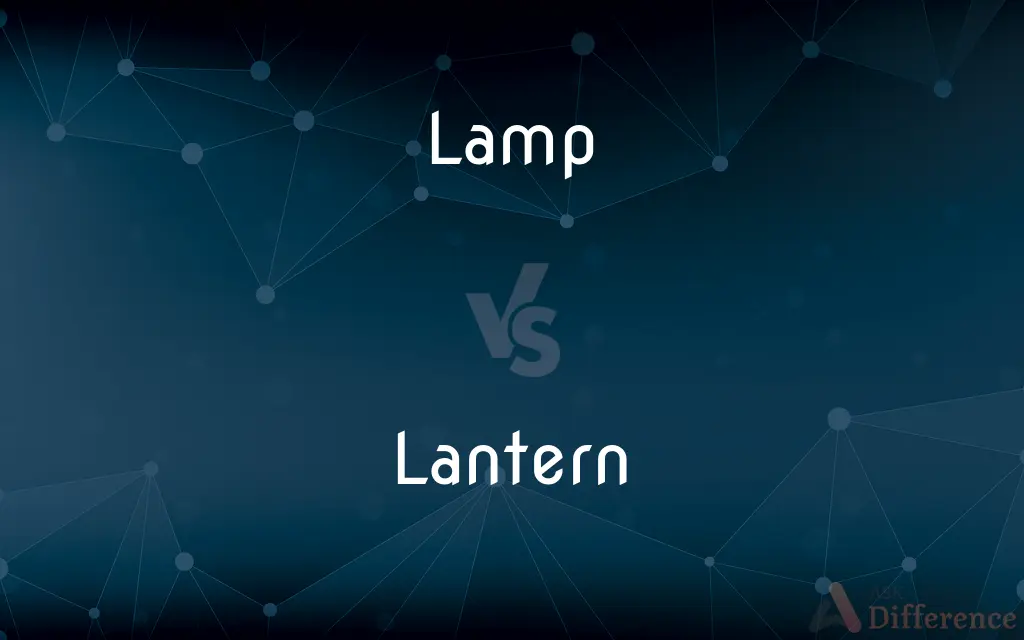Lamp vs. Lantern — What's the Difference?
By Tayyaba Rehman — Updated on November 1, 2023
A lamp is a device that provides light, often from an electric source, while a lantern is a portable lighting device with sides that protect the flame or bulb.

Difference Between Lamp and Lantern
Table of Contents
ADVERTISEMENT
Key Differences
A lamp is typically an electrical device, often designed for a fixed location like a table or a desk. Lamps usually derive power from an outlet and can serve both functional and decorative purposes. On the other hand, a lantern is often associated with portability. It is a lighting device that is designed to be mobile, featuring a protective enclosure for the light source. The lantern’s design, with sides or panels, helps shield the flame or bulb from wind and external factors, making it suitable for outdoor use.
While lamps can offer focused or ambient lighting depending on their design, lanterns often disperse light more uniformly due to their construction. Moreover, lamps are usually associated with interiors and indoor activities, like reading. In contrast, lanterns, with their protective design, are more commonly associated with outdoor activities, such as camping or evening walks.
In essence, while both lamps and lanterns serve the purpose of providing light, they differ in design, functionality, and typical usage scenarios.
Comparison Chart
Power Source
Often electric from an outlet.
Can be battery-powered, fuel, or electric.
Portability
Typically stationary.
Designed for mobility.
ADVERTISEMENT
Usage Location
Predominantly indoor.
Often outdoor or portable settings.
Function
Both functional and decorative.
Primarily functional.
Protection
No protective sides around the bulb.
Sides/panels protect the light source.
Compare with Definitions
Lamp
A device for giving light, either by a bulb or flame.
I turned on the lamp to read my book.
Lantern
A structure with open sides to let out light, as on a roof.
The old building had a lantern on top, illuminating its presence.
Lamp
A source of illumination in a room.
The dim lamp provided a cozy ambiance.
Lantern
A portable lighting instrument using a flame or bulb.
The campers hung a lantern from the tree for light.
Lamp
An electrical light fixture, usually standing on a table or desk.
The beautiful ceramic lamp complemented the room's decor.
Lantern
A signal or symbol of illumination.
The lighthouse used a massive lantern to guide ships.
Lamp
A device in which a light-producing agent is placed.
The oil lamp emitted a warm, flickering light.
Lantern
A light with a transparent or translucent protective casing.
The paper lanterns floated up into the night sky.
Lamp
An instrument for emitting radiation or heat, as in science labs.
The UV lamp is used to detect counterfeit bills.
Lantern
A lantern is an often portable source of lighting, typically featuring a protective enclosure for the light source – historically usually a candle or a wick in oil, and often a battery-powered light in modern times – to make it easier to carry and hang up, and make it more reliable outdoors or in drafty interiors. Lanterns may also be used for signaling, as torches, or as general light-sources outdoors.
Lamp
An electric device having a socket for a light bulb, especially a free-standing piece of furniture.
Lantern
An often portable case with transparent or translucent sides for holding and protecting a light.
Lamp
A device that gives off ultraviolet, infrared, or other radiation, used for therapeutic purposes.
Lantern
A decorative casing for a light, often of paper.
Lamp
A light bulb
A spotlight fitted with a metal-halide lamp.
Lantern
A light and its protective or decorative case.
Lamp
A vessel containing oil or alcohol burned through a wick.
Lantern
The room at the top of a lighthouse where the light is located.
Lamp
A lantern or fixture that gives off light by burning gas, usually by means of a mantle.
Lantern
(Obsolete) A lighthouse.
Lamp
(Archaic) A celestial body that gives off or reflects light.
Lantern
A structure built on top of a roof or dome with open or windowed walls to admit light and air.
Lamp
A device that generates heat, light or other radiation. Especially an electric light bulb.
Lantern
A case of translucent or transparent material made to protect a flame, or light, used to illuminate its surroundings.
Lamp
A device containing oil, burnt through a wick for illumination; an oil lamp.
Lantern
(theatre) Especially, a metal casing with lens used to illuminate a stage (e.g. spotlight, floodlight).
Lamp
A piece of furniture holding one or more electric light sockets.
Lantern
(architectural element) An open structure of light material set upon a roof, to give light and air to the interior.
Lamp
To hit, clout, belt, wallop.
Lantern
(architecture) A cage or open chamber of rich architecture, open below into the building or tower which it crowns.
Lamp
To hunt at night using a lamp; see lamping.
Lantern
(architecture) A smaller and secondary cupola crowning a larger one, for ornament, or to admit light.
The lantern of the cupola of the Capitol at Washington, or that of the Florence cathedral
Lamp
To hang out or chill; to do nothing in particular.
Lantern
(engineering) A lantern pinion or trundle wheel.
Lamp
A thin plate or lamina.
Lantern
(steam engines) A kind of cage inserted in a stuffing box and surrounding a piston rod, to separate the packing into two parts and form a chamber between for the reception of steam, etc.; a lantern brass.
Lamp
A light-producing vessel, device, instrument or apparatus;
Lantern
(rail transport) A light formerly used as a signal by a railway guard or conductor at night.
Lamp
Figuratively, anything which enlightens intellectually or morally; anything regarded metaphorically a performing the uses of a lamp.
Thy word is a lamp unto my feet, and a light unto my path.
Ages elapsed ere Homer's lamp appeared.
Lantern
(metalworking) A perforated barrel to form a core upon.
Lamp
A device or mechanism for producing light by electricity, usually having a glass bulb or tube containing the light-emitting element. Most lamps belong to one of two categories, the Incandescent lamp (See under Incandescent) or the fluorescent lamp. However, see also arc lamp, below.
Lantern
(zoology) Aristotle's lantern
Lamp
A device that emits radiant energy in the form of heat, infrared, or ultraviolet rays; as, a heat lamp.
Lantern
(transitive) To furnish with a lantern.
To lantern a lighthouse
Lamp
An artificial source of visible illumination
Lantern
Of a facial feature, large and squarish in shape as an old-fashioned lantern.
Lamp
A piece of furniture holding one or more electric light bulbs
Lantern
Something inclosing a light, and protecting it from wind, rain, etc.; - sometimes portable, as a closed vessel or case of horn, perforated tin, glass, oiled paper, or other material, having a lamp or candle within; sometimes fixed, as the glazed inclosure of a street light, or of a lighthouse light.
Lantern
An open structure of light material set upon a roof, to give light and air to the interior.
Lantern
A lantern pinion or trundle wheel. See Lantern pinion (below).
Lantern
A kind of cage inserted in a stuffing box and surrounding a piston rod, to separate the packing into two parts and form a chamber between for the reception of steam, etc.; - called also lantern brass.
Lantern
A perforated barrel to form a core upon.
Lantern
See Aristotle's lantern.
Lantern
To furnish with a lantern; as, to lantern a lighthouse.
Lantern
Light in a transparent protective case
Lantern
A portable device for giving light, with a protective case.
She carried a lantern during the nighttime hike.
Common Curiosities
Can a lamp use a flame instead of a bulb?
Yes, traditional lamps, like oil lamps, use a flame.
Are all lanterns designed for outdoor use?
No, while many lanterns are designed for outdoor use, some can be decorative for indoor settings.
How does the light distribution differ between lamps and lanterns?
Lamps can focus or disperse light based on design, while lanterns generally disperse light uniformly.
Is a lantern’s light source always protected?
Typically, yes. Lanterns have protective casings to shield the light source.
Do lanterns only use batteries as their power source?
No, lanterns can use batteries, fuel, or electricity.
What's a notable difference in the design of lamps and lanterns?
Lamps often lack protective sides, while lanterns have sides or panels.
What is a lamp typically used for?
A lamp is often used for indoor lighting, either functional or decorative.
Is it common to find lamps in outdoor settings?
It's less common compared to lanterns, as lamps are predominantly designed for indoor use.
Do lamps only operate on electricity?
No, while many modern lamps are electric, there are also battery-operated and flame-based lamps.
What is the primary purpose of a lantern's protective casing?
To shield the flame or bulb from external elements, especially wind.
Are lanterns typically heavier than lamps?
Not necessarily. It depends on the materials and design of both.
Can the term "lamp" refer to a source of radiation?
Yes, in specific contexts like laboratories, a lamp can be a source of radiation or heat.
Can lanterns be decorative?
Yes, some lanterns, like paper lanterns, are used for decorative purposes.
Are all lamps designed to stand on tables or desks?
No, while many do, lamps can also hang, be wall-mounted, or stand on the floor.
Are lamps and lanterns made from similar materials?
They can be, but material choice often depends on design, purpose, and the setting in which they're used.
Share Your Discovery

Previous Comparison
Burglar vs. Robber
Next Comparison
Cyberpower vs. ApcAuthor Spotlight
Written by
Tayyaba RehmanTayyaba Rehman is a distinguished writer, currently serving as a primary contributor to askdifference.com. As a researcher in semantics and etymology, Tayyaba's passion for the complexity of languages and their distinctions has found a perfect home on the platform. Tayyaba delves into the intricacies of language, distinguishing between commonly confused words and phrases, thereby providing clarity for readers worldwide.














































